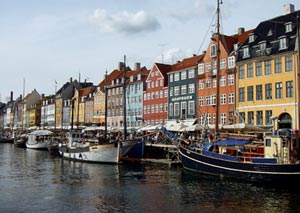Studying in Denmark

It is very common nowadays for young Nepalis aspiring to study abroad to choose the USA, Canada, Australia or even India to apply to colleges there.
But why is an increasing number of young students are now attracted to European countries even though they are much more expensive to live in? Scandinavian countries – Denmark, Sweden, Norway, and Finland – have now started to stand out among the best choices for Nepali students.
Denmark, for instance, welcomes Nepali students from Nepal as well as other parts of the world. According to the Vice Consul at the Embassy of Denmark in Kathmandu, there were as many as110 Nepalis who applied for student visas in 2011.
Although the number of Nepali students applying to study in Denmark is slightly declining due to the increased test requirements of IELTS and TOEFL for the past to years, there are Nepalis who come to Denmark from other parts of Europe to study there.
Santosh Kumar Karki, the Managing Director of Elmira International Education at Dilli Bazaar in Kathmandu, which provides consultancy to students applying to study in Denmark, says, “Although the number of people who are actually going may have decreased now, I don’t think the number of students consulting and applying to Denmark has decreased. We still have at 45 to 50 people applying, and the number has been increasing annually. Most people believe that they have to at least try once to go to Europe rather than staying in Nepal.”
Asmita Shakya, a Nepali student, has been studying International Sales and Marketing for an AP degree for six months in Denmark.
Talking about her choice of studying in Denmark, she says, "I was always interested in studying in Scandinavian countries. It is different living here than in any other part of the world, as Denmark has a very safe and secure environment and also has a high value for human rights and social system."
Like most international students, Shakya, a +2 graduate, had to take up a two-year AP degree in order to apply for a Bachelor´s degree in the future. She adds, "The extra two years of study and not being able to find work here had made me very frustrated in the beginning. But then, I also learnt to become independent and followed the rules. I learnt things other than the theoretical knowledge that I received in school."
The first World Happiness Report of 2012 by the United Nations marks Denmark as the happiest place in the world, followed by Finland, and Norway.
The facilities provided by the Danish welfare system are free healthcare, discounts in travel, financial support and free education for children along with other educational facilities such as libraries and counseling with no extra costs.
Danish education is distinguished by very liberal problem-oriented learning methods such as project writing and practical understanding, along with critical thinking of others’ as well as one´s own works.
Also, Danish teachers share an open-minded understanding and relationship with students. There is an underlying respect for teachers even though they choose to work with students on first-name basis.
Sabin Joshi, an undergraduate student of web development, says, "When I came here and started life as a student, I became closer here so now I love being here."
He adds that if given the chance to work there after finishing his studies, he would love to stay due to various factors, such as the high social security and working environment.
There are also various problems for most Nepali students in the beginning during their stay in Denmark. The academic fees for international students from outside Europe in Danish institutions is from Rs 965,000 to 120,000 per annum, which is quite high for most Nepali students.
There is also a very high taxation of 35 to 65 percent.
Also, if one hopes to work while studying, it is definitely very difficult for people who don’t speak Danish to look for employment.
Although a few of them are lucky enough to find good jobs in comfortable workplaces, most students can only get jobs of waiting at tables, cleaning and dishwashing, among various menial jobs.
As these jobs exceedingly demand time and energy, it leaves little time for most students to concentrate on their studies. But as mentioned earlier, people still choose to study in Denmark.
Considering Nepal´s education system, social security and stability, it is understandable why students would choose to get liberal education in countries like Denmark.
It is also very likely that many of such students would choose to live there after their education due to job opportunities in various fields. But there are also some who would like to come back and use their education in Nepal.A case in point is Sarita Shrestha, an undergraduate student of Global Nutrition and Health, who mentions, "I want to go back to my own country and utilize the knowledge and skills I learnt during my stay in Denmark."
Whatever the case, however, a country like Denmark does prove to be a good choice for Nepalis in the field of education.
source: Karma, Preeti A(2012),"Studying in Denmark ", myreblica,6 May 2012
Posted on: 2012-05-06































